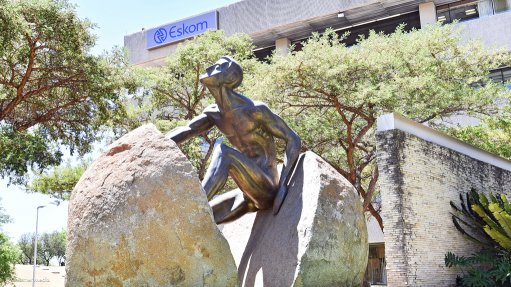
Photo by: Creamer Media's Donna Slater
The National Energy Regulator of South Africa (Nersa) and Eskom have reached an agreement to add R10-billion to Eskom’s allowable revenue in 2021/22, to be recovered through the tariff, pending the outcome of an appeal of a 2020 High Court ruling directing the regulator to immediately add back R23-billion of a larger R69-billion equity injection illegally deducted from the utility’s allowable revenue.
Nersa confirmed in a statement that the court order would result in an average tariff percentage increase of 15.63% in the 2021/22 financial year.
The settlement was confirmed in a February 15 court order made by Justice Joseph Raulinga, who, on January 29, heard Eskom’s application to have the High Court order executed pending Nersa’s appeal to the Supreme Court of Appeal (SCA).
Nersa opposed Eskom’s application, which was made under Section 18 of the Superior Courts Act.
The court order states that “an amount of 5.44c/kWh will be added to the average standard tariff for Eskom customers in the 2021/22 tariff year making the aggregate standard tariff for Eskom customers in the 2021/22 tariff year 134.30c/kWh”.
Together with several other determinations made by Nersa, the court order is likely to mean that Eskom secures the additional R23-billion revenue that it told the court it needed to avoid financial calamity and to lower the risk of it requiring yet further equity injections from the State.
Besides the additional R10-billion, Eskom was also entitled to recover R6.6-billion of the R13.2-billion that Nersa said could be recouped following its adjudication of Eskom’s 2019 regulatory clearing account (RCA) submission.
In addition, the Energy Regulator approved that Eskom’s RCA applications for the three financial years from 2014/15 to 2016/17 and Eskom’s supplementary tariff application for the 2018/19 financial year, which amounted to of R4.75-billion and R1.29-billion respectively, be recovered in the 2021/22 financial year.
Both applications arose from previous adverse court rulings against the regulator.
"This will result in an average tariff percentage increase of 15.63% in the 2021/22 financial year," Nersa said in a statement.
The utility was initially due a rise in allowable revenue for the year as determined by the regulator following its 2019 adjudication of Eskom’s fourth multiyear price determination, through which it was granted a 5.22% hike.
Importantly, the agreement between Nersa and Eskom deals only with the first R10-billion of a larger R69-billion claim, with the R59-billion balance to be the subject of the SCA process.
Nersa said the court order followed discussions and an agreement between Nersa and Eskom and was informed by the fact that Nersa had already taken decisions on other Eskom applications that would be implemented in the 2021/22 financial year, which had a direct impact on the application Eskom had made to the court.
"However, this order does not stop Nersa from proceeding with the appeal that has commenced at the Supreme Court of Appeal against the High Court’s judgement of 28 July 2020, which substituted the Energy Regulator’s decision on Eskom’s fourth Multi-Year Price Determination with its own."
Eskom CFO Calib Cassim welcomed the decision, and stressed that poor residential customers would continue to be supported through the free basic electricity programme, as well as affordability subsidies provided for in the Nersa tariff decision.
"Identified vulnerable industrial sectors will be considered by Nersa in terms of the short-term and long-term negotiated pricing agreements promulgated recently by the Department of Mineral Resources and Energy," he added.
There would be a lag between the implementation of Eskom's hike, which would come into effect on April 1, and the hikes experienced by municipal customers, as these would be implemented in July. These municipal hikes are typically higher than the Eskom increase, as the municipalities have a shorter period in which to recover the increase.